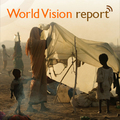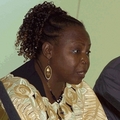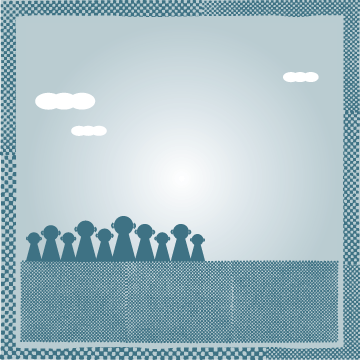Cooking up a new definition of Afrocentrism
From KALW | 06:14
When people from Africa move to the U.S., they’re faced with a question: are they African Americans, or Africans in America? Many tend to call themselves members of the African Diaspora, like Oakland residents Tsedey Seifu and Faiza Farah. Both of Ethiopian heritage, they say they want to redefine what it means to be African in urban America, so they started a local organization called Afro Urbanites. It’s a social group, bringing together members of the Bay Area African Diaspora to share their culture with each other and the general public. Last month, they launched a pop-up kitchen, at Guerilla Cafe, in Berkeley, where they cook Ethiopian cuisine and hold traditional ceremonies. KALW News’ Hana Baba sat down with Seifu and Farah and asked them what their vision is.
- Playing
- Cooking up a new definition of Afrocentrism
- From
- KALW
 When people from Africa move to the U.S., they’re faced with a question: are they African Americans, or Africans in America? Many tend to call themselves members of the African Diaspora, like Oakland residents Tsedey Seifu and Faiza Farah. Both of Ethiopian heritage, they say they want to redefine what it means to be African in urban America, so they started a local organization called Afro Urbanites. It’s a social group, bringing together members of the Bay Area African Diaspora to share their culture with each other and the general public. Last month, they launched a pop-up kitchen, at Guerilla Cafe, in Berkeley, where they cook Ethiopian cuisine and hold traditional ceremonies. KALW News’ Hana Baba sat down with Seifu and Farah and asked them what their vision is.
When people from Africa move to the U.S., they’re faced with a question: are they African Americans, or Africans in America? Many tend to call themselves members of the African Diaspora, like Oakland residents Tsedey Seifu and Faiza Farah. Both of Ethiopian heritage, they say they want to redefine what it means to be African in urban America, so they started a local organization called Afro Urbanites. It’s a social group, bringing together members of the Bay Area African Diaspora to share their culture with each other and the general public. Last month, they launched a pop-up kitchen, at Guerilla Cafe, in Berkeley, where they cook Ethiopian cuisine and hold traditional ceremonies. KALW News’ Hana Baba sat down with Seifu and Farah and asked them what their vision is.
Southern Sudanese in Kenya vote for a new country
From Becky Palmstrom | 05:18
As the newest country in the world celebrates, Becky Palmstrom travels to Kenya to hear the prayers and songs of the refugees waiting to return to their homeland.
 Come July, Southern Sudan is set to become the newest country in the world. The journey to independence has not been easy. After decades of war between north and south, a peace treaty finally gave South Sudan a chance to vote for independence. Becky Palmstrom went to Kakuma Refugee camp in Kenya, where thousands of Southern Sudanese refugees have spent decades living in exile, waiting to return. There the referendum is literally an answer to their prayers. This piece brings you to this barren region of Kenya through the voices, the ambiance and the songs of these refugees.
Come July, Southern Sudan is set to become the newest country in the world. The journey to independence has not been easy. After decades of war between north and south, a peace treaty finally gave South Sudan a chance to vote for independence. Becky Palmstrom went to Kakuma Refugee camp in Kenya, where thousands of Southern Sudanese refugees have spent decades living in exile, waiting to return. There the referendum is literally an answer to their prayers. This piece brings you to this barren region of Kenya through the voices, the ambiance and the songs of these refugees.
Walter Backerman, Seltzer Man
From Radio Diaries | Part of the The Radio Diaries Podcast series | 12:27
When Walter's grandfather drove his cart there were thousands of seltzer men in the city; today Walter is one of the last.
- Playing
- Walter Backerman, Seltzer Man
- From
- Radio Diaries
 Back in 1919, Walter Backerman's grandfather delivered seltzer by horse and wagon on Manhattan's Lower East Side. Today, Walter continues to deliver seltzer around the streets of New York. Some customers, like Mildred Blitz, have been on the family route for more than 50 years. When Walter's grandfather drove his cart there were thousands of seltzer men in the city; today Walter is one of the last.
Back in 1919, Walter Backerman's grandfather delivered seltzer by horse and wagon on Manhattan's Lower East Side. Today, Walter continues to deliver seltzer around the streets of New York. Some customers, like Mildred Blitz, have been on the family route for more than 50 years. When Walter's grandfather drove his cart there were thousands of seltzer men in the city; today Walter is one of the last.
Somali Chefs Showdown in Sambusa Cook-Off
From KFAI Minneapolis | 07:56
KFAI's Dale Connelly filed this report about five Somali chefs taking part in a Sambusa Cook-Off that presented challenges for chefs who are not used to using ingredients outside of Somalia to make their deep fried pastries.
 KFAI's Dale Connelly filed this report about five Somali chefs taking part in a Sambusa Cook-Off that presented challenges for chefs who are not used to using ingredients outside of Somalia to make their deep fried pastries.
KFAI's Dale Connelly filed this report about five Somali chefs taking part in a Sambusa Cook-Off that presented challenges for chefs who are not used to using ingredients outside of Somalia to make their deep fried pastries.
For My Children, For Myself
From Salt Institute for Documentary Studies | 07:16
Somali refugee Abdi Said, 11, narrates his mother's story of war, marriage, and escape.
 Fleeing Somalia because of war, Nimo Saeed came to Maine with her three young children. She did not speak a word of English. Nimo is now learning how to read. Her eldest son, Abdi, who is eleven years old, helps narrate her story.
Fleeing Somalia because of war, Nimo Saeed came to Maine with her three young children. She did not speak a word of English. Nimo is now learning how to read. Her eldest son, Abdi, who is eleven years old, helps narrate her story.
The Sonic World of Nancy Scott
From Salt Institute for Documentary Studies | 06:51
Sound artist Nancy Scott's ears are tuned to the sounds most of us overlook.
 There is an art to listening. Brunswick, Maine sound artist Nancy Scott's ears are tuned to the sounds most of us overlook. With her friend and mentor Alyce Ornella, Nancy explores the tonality of the everyday world.
Photo by Louise Baker.
There is an art to listening. Brunswick, Maine sound artist Nancy Scott's ears are tuned to the sounds most of us overlook. With her friend and mentor Alyce Ornella, Nancy explores the tonality of the everyday world.
Photo by Louise Baker.
What Do You See When You See a Somali Girl
From KBEM | Part of the What's Real series | 01:00
The high school student poet argues against the idea that Somali women are oppressed.
- Playing
- What Do You See When You See a Somali Girl
- From
- KBEM
 The student poet is very definate in arguing against the idea that Somali women are objects of oppression. In her view, it is her choice to accept the traditional role of women in Somali Muslim culture.
The student poet is very definate in arguing against the idea that Somali women are objects of oppression. In her view, it is her choice to accept the traditional role of women in Somali Muslim culture.
All items in the What’s Real series are self enclosed w/music on each end written and voiced by Minneapolis High School students.
Waiting in Dadaab
From World Vision Report | Part of the Stories from the World Vision Report series | 03:59
The unrest in the Middle East is causing a huge refugee crisis. How this will play out in the long term is anyone’s guess. But history tells us refugees sometimes never return home. This September will mark the 20th anniversary of the opening of Dadaab, the world's largest refugee camp. Almost all of Dadaab's 270,000 refugees fled to the camp in eastern Kenya to escape the conflict in neighboring Somalia. But as reporter Nick Wadhams found out during a recent visit, no one is celebrating the upcoming milestone.
- Playing
- Waiting in Dadaab
- From
- World Vision Report
 If you air this piece, please include a back announce saying "This piece originally aired on the World Vision Report." or "This piece came to us from the World Vision Report."
If you air this piece, please include a back announce saying "This piece originally aired on the World Vision Report." or "This piece came to us from the World Vision Report."
Documentary - Coal: Dirty Past, Hazy Future
From The Environment Report | 58:30
Brew the coffee, turn on the radio, and check your electronic mail – you’re on your way to burning 20 pounds of coal for the day. That’s how much coal the average American uses. No matter what, we all have a stake in coal’s future. This hour-long documentary takes an in-depth look at that future.
 This documentary will take your listeners on a journey from their light switch back to America’s coal fields. We start at Thomas Edison’s Menlo Park Lab; visit a coal-burning power generating station; go down into a coal mine in Illinois; travel to the rural counties of West Virginia where mountaintop mining is pulling on the state’s social fabric; and take a closer look at the technologies that promise to deliver coal into the new green economy. The Environment Report’s documentary explores the effects of coal in our lives and in the lives of those who depend on coal for a living.
This documentary will take your listeners on a journey from their light switch back to America’s coal fields. We start at Thomas Edison’s Menlo Park Lab; visit a coal-burning power generating station; go down into a coal mine in Illinois; travel to the rural counties of West Virginia where mountaintop mining is pulling on the state’s social fabric; and take a closer look at the technologies that promise to deliver coal into the new green economy. The Environment Report’s documentary explores the effects of coal in our lives and in the lives of those who depend on coal for a living.
The documentary is also available on Content Depot.
A big thanks to the people at the Joyce Foundation for providing the funding for this special project. See below for rundown information.
Can Africa's Most Violent Men Fight for Peace?
From PBS Women, War & Peace Podcast | 07:53
Through the African Union’s Peace and Security Department, activist Stella Sabiiti works with rebels who inflict violence on civilians in conflict zones like Darfur and Somalia. Sabiiti tells us how her own experience as a victim of torture in Uganda has been vital to her understanding of the minds of perpetrators.

Welcome to Women, War & Peace’s podcast series with our host, Amy Costello. Each week, Amy will be talking to people who have responded creatively to the plight of women living in conflict zones.
Activist Stella Sabiiti has seen the best and worst of humanity. She was a pregnant college student in Uganda when she was captured and tortured by dictator Idi Amin’s troops. After escaping the country and living as a refugee, she returned to conflict zones such as Darfur and Somalia, this time as a peace mediator.
Through the African Union’s Peace and Security Department, Sabiiti now frequently works with rebels who inflict violence on civilians. She says it’s her very experience as a victim that gives her the ability to see a perpetrator’s humanity, a skill she believes is necessary to convince rebels to join the fight for peace.
